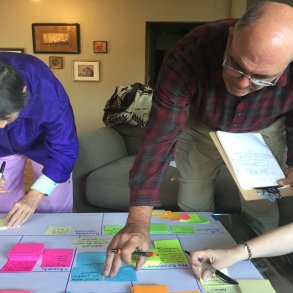By Natasha Miller Naderi and originally published on Linked In
What dangers does ego create in organizations? What feeds the ego in traditional, hierarchical organizations? What mechanisms can we put into place in conscious future (“Teal”) organizations, to guard against the ego and enable every person to thrive? How would we define ‘Power’ in these new kinds of organizations?
1. What dangers does ego create in organizations?
Ego creates an environment where everyone is out for themselves. Each one plays their own game, which results in a trust-less environment.
When someone is operating from a place of ego – that is all we can observe in them. We are not able to see them as a whole person. We can only observe their ego.
Staff become afraid of making errors when ego is on the line. This created a fear-driven and oppressive environment.
When the goal of a conversation is to defend one’s ego, communication becomes complicated and easily deteriorates into conflict.
Ego feeds negative behaviors (manipulation, greed, self-promotion, judgment) and increases negative energy, which then spirals and spreads like a virus throughout the organization.
2. What feeds the ego in traditional, hierarchical organizations?
Traditional organizations feed ego through competition for promotions, giving people in higher positions power over people in lower positions, and through giving substantially more money and rewards to those in higher positions.
The pyramid shaped structure feeds a sense of superiority of those at the top and feelings of inferiority of those at the bottom.
False rankings of human superiority and inferiority through role titles and positions in the chart support judgment of differences in value and worth of one person vs. another person
Being self-centered and pursuing one’s personal agenda is rewarded, as those who get noticed and act ambitiously are often the ones who get promoted.
Deference and excessive agreement of those at the bottom of organizations to those with more ‘power’, along with lack of upward feedback, all feed delusional thinking at the top of inherent superiority.
Special privileges such as big titles, big offices, special parking spaces, and more contribute to feeding egos too.
3. What mechanisms can we put into place in Teal organizations, to guard against the dangers of ego and enable every person to thrive?
There are so many ways to guard against ego, create more positive energy, and enable everyone. Here are some of them.
We can source ideas from the collective and discuss the best course of action together. As we acknowledge the idea and person, everyone is encouraged to participate.
Through implementing “consent” decision-making, we encourage all ideas to move forward, from anywhere and everywhere, as long as there is no strong objection.
Practicing mindfulness and self-awareness techniques helps everyone shift away from ego-focus.
Removing fancy titles and privileges that reinforce superior/ inferior relationships protects us from our own ego attachments.
Through developing our personal maturity, more empathy for others, and practice radical listening, we shift away from ourselves.
We can deconstructing the pyramid shape in our organizational charts and depict relationships as networks of teams, the sum of which creates value to the market.
Through changing our language we can remove dichotomies of inferior and superior, us vs. them relationships. For example, we can reframe “policies” into “agreements” which we all agree to adhere to and to enforce. We can remove patronizing language that support adult-to-child relationships, commanding what the inferior “should” and “should not” do; and shift to language that empowers everyone to step up to responsibility and accountability.
We can redistribute responsibilities of the boss to everyone (ex. conflict resolution, decision-making, developing others.)
Through reducing wealth inequality, (for example, ensuring the top salary cannot make more than 8x lowest salary) we can signal the worth of all members of the organization.
4. How would we define ‘Power’ in Teal Organizations?
Power in Teal is when the whole organization is aligned to achieve the organization’s goals and where ideas are free flowing and encouraged from all directions
Power is about bring out what you have inside. Bringing all of your strengths, energy, and passion to the group.
Power is the ability of everyone to make decisions, influence, change rules, be heard and respected.
A powerful teal organization, is able to shape and make a great impact on the market and external environment.
Different talents and strengths combined together and aligned to same purpose, powers teal organizations
Power in teal is about taking full responsibility for results and having no one else to blame but yourself! (That’s the hard part!)
What would you add to this? Please share in your views and experience. I’d love to know! Ready to participate in the next Global Teal Meet-Up in October? Free of Charge & All are Welcome! Sign up here: https://www.tealaroundtheworld.com/
Republished with permission.
Featured Image added by Enlivening Edge Magazine. Image by Goumbik from Pixabay




